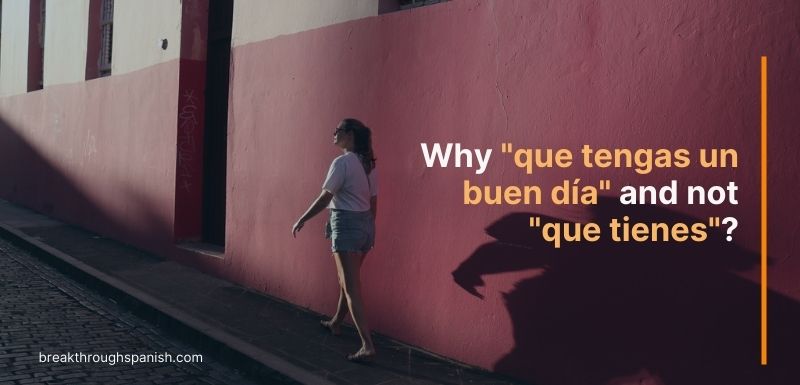Que tengas un buen día is a shortened version of an implied fuller expression: [espero] que tengas un buen día — [I hope] that you have a good day.
With verbs like esperar, which carry uncertainty, we use a verb form called the subjunctive.
Verbs like desear or querer could theoretically also precede “Que tengas un buen día”:
Deseo que tengas un buen día — I wish you a good day
Quiero que tengas un buen día — I want you to have a good day (so I’m giving you $100, or something)
In the rest of this article, we’ll take a look at more common expressions similar to que tengas un buen día.
These expessions also use the subjunctive, and we’ll look into how they work.
Que tengas or ten un buen día?
Technically, you can say both que tengas un buen día and ten un buen día.
But the version with que tengas is more common, because you’re wishing someone a good day. It carries the connotation of hopefulness for someone’s day that “have a good day” carries in English.
Ten un buen día is a bit more like, “Go and have a good day.”
What other expressions would use Que + Subjunctive in Spanish?
When you’re learning the subjunctive, Que + Subjunctive is one of the most straightforward situations.
“Que” + verb pretty much always triggers the subjunctive.
And even if you’re not learning anything about the subjunctive mood yet, you can learn these as set expressions and tackle the grammar later on.
Que tengas un buen día
Meaning “have a good day”, tengas comes from tener — to have.
Tener is one of those tricky verbs that’s irregular in all of its tenses. You’ll master it eventually, but for now just know that tenga is used in these Que + verb situations.
Like other verbs in Spanish, you the ending of tenga changes depending on who you’re speaking to:
| Que (yo) tenga |
| Que (tú) tengas |
| Que (él, ella, usted) tenga |
| Que (nosotros) tengamos |
| Que (vosotros) tengáis [Spain] |
| Que (ellos, ellas, ustedes) tengan |
Listen to the pronunciation of Que tengas un buen día (tú form) here:
Listen to the pronunciation of Que tenga un buen día (usted form) here:
Que te vaya bien
This is a great colloquial expression for saying “have a good day” or “have a good one”. It’s natural and a bit less of a direct translation from “have a good day”.
Literally, this means “(I hope) that it to you goes well”
Vaya comes from the verb ir — to go. When we use the subjunctive with ir, it becomes vaya.
If you’re saying this in the usted form, you’ll say Que le vaya bien
Note that in this example, what changes is te and le, not the verb vaya. That’s because vaya goes with the implied “it” in “that it to you goes well.”
Listen to the pronunciation of que te vaya bien (tú form) here:
Listen to the pronunciation of que le vaya bien (usted form) here
Que disfrutes
This means Enjoy. Say you and your partner are headed out for a day at the beach. Your friend might say, “Que disfruten!” — ”enjoy!”
Literally, this means “(I hope) that you enjoy”
Disfrutar means to enjoy. Normally, we’d say tú disfrutas – you enjoy. But since we’re saying “(I hope) that you enjoy”, we change the ending to –es: que (tú) disfrutes.
If we were saying this in the usted form, we’d leave off the S: que disfrute.
If we were saying this to a group of people (like in the example above), we add an N: que disfruten.
Listen to the pronunciation here with the phrase, espero que lo disfrute:
Que duermas bien
How a mother might say to her child, “Sleep tight!” Or, “sleep well.” Que duermas bien isn’t reserved to family, though. Say you were sharing a house with friends on vacation, you might say que duermas bien to a friend who’s heading off to bed.
Literally, this means (I hope) “that you sleep well”
Dormir means to sleep, and it’s a “stem-changing verb”. This means it changes o → ue, like other verbs including poder (yo puedo) and contar (yo cuento).
Since dormir ends in -ir, it acts like an -ar verb in the subjunctive form. So we say que duermas with an -as.
Listen to the pronunciation here:
Que descanses
Similar to que duermas bien, que descanses is a nice way to say “rest up” or “sleep well”.
Descansar is a verb meaning to rest. Since it’s an -ar verb, we change the ending to –es in this form (subjunctive).
If we were saying it in the usted form, we’d say, que descanse (without the S).
Listen to the pronunciation here:

Que estés bien
This is similar to que te vaya bien – it’s like saying “take care” or “have a good one”.
Literally, que estés bien means “(I hope) that you (will be) well.”
It comes from Estar, meaning to be. Since it would normally end in estás (as in, ¿Cómo estás?), we need to change it to estés in this situation.
If we were using this in the usted form, we’d say, que esté bien — without the S.
Listen to pronunciation here with the phrase espero que estés bien.
Que + Subjunctive verb is a useful sentence structure
Like with other tricky parts of Spanish, you don’t need to master the grammar behind it before being able to use these expressions.
But as a quick summary, the cliff notes are these:
In the Spanish subjunctive, -ar verbs act like -er verbs, and -ir/-er verbs act like -ar verbs.
Start by learning some of these key expressions, then look into the details of the subjunctive. Once you’ve seen lots of examples in context, the grammar explanations will make much more sense.
Done reading? Time to practice!
What other verbs could you put with Que + verb? Think of things you might wish for someone else or to someone else… Arriving safely, enjoying a trip, having a good time.
Write your sentence(s) in the comments for feedback!



This is something I have definitely been wondering about, especially since I’m traveling in Mexico right now and have frequently said “Que te vaya bien.” Perfect timing for all these helpful tips!
For my son and his wife, who will be traveling to join us soon, would I say, “Que viajen bien”?
Que te vaya bien is a good one! “Que viajen bien” is technically correct grammar, but in the context of a trip, people just say “buen viaje” — like bon voyage. You could also say “que tengas un buen viaje”.
que tengas una buena tarde
que recupere rapidamente
que me llame pronto
Muy bien! The last one is more something you’d say in the context of “I want you to call me soon” — quiero que me llame pronto. Or, “I hope that you call me soon”, “Espero que me llame pronto”.